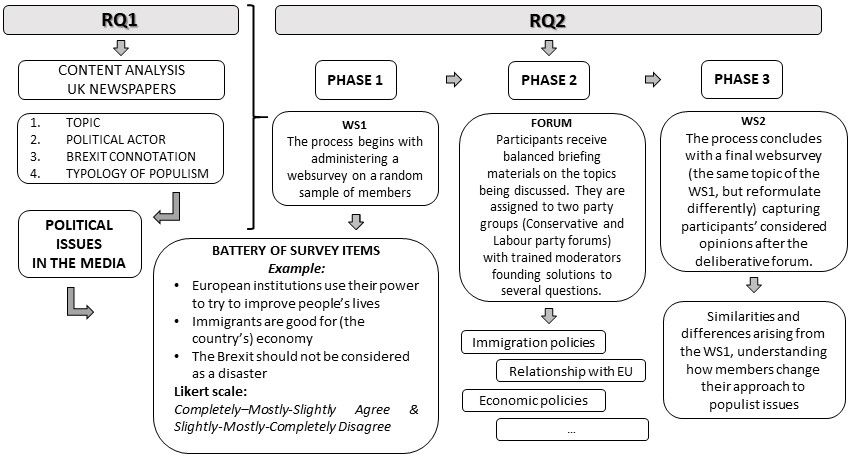Supporting Democracy - Involving members of political parties to counter the rise of populism
Newsletter
Reflecting on the challenges posed by the rise of populism, Marino De Luca analyses Brexit as a case study and proposes an active involvement of political parties to tackle this phenomenon.
Marino De Luca
in his own words
I’m currently a Marie Skłodowska-Curie Research Fellow at the Department of Politics in the School of Law, Politics and Sociology at the University of Sussex. My supervisor is Paul Taggart, Professor of Politics and one of the most respected scholars on populism.
I hold a PhD in political and social science from the University of Calabria, a Master of Science in internationalisation and communications from the University for Foreigners of Perugia, a post-graduate qualification in international election observation & electoral assistance from the University of Basque Country and a Bachelor of Arts in political communication from the University of Perugia.

I was also visiting research fellow in political communication at the Université Paris-Est Créteil Val de Marne as well as adjunct professor in public policy analysis and postdoc in politics at the University of Cagliari, and a research fellow in political communication at the University of Torino.
Before starting my MSCA, I worked in the socio-statistical-economic field at the Italian Ministry of Labour and Social Policy (Legislative Office and the Independent Office for the Evaluation of Performance).
I’m currently on the scientific committee of the Italian Society of Electoral Studies (SISE) and a member of the Italian Journal of Electoral Studies (QOE/IJES) editorial board.
My main research is about political parties, elections, intra-party democracy, political communication and populism.
In 2016, the United Kingdom (UK) voted to leave the European Union by 52% to 48%, creating an unprecedented situation. Very often, the results of this election have been depicted as a victory of populism, and some parts of the media have been blamed for having played with the general public’s emotions. How can we avoid the repeat of such events in the future?

Populism, media communication and democracy
With his MSCA project called ‘Populism in post-Brexit Europe,’ Marino is currently analysing populism through the link between media communication and democracy, using the Brexit context as a case study. “Brexit represented a critical phenomenon both for stability and increased populist reactions in the UK against the European Union and vice versa,” explains Marino.
The main purpose of the project is to understand how to counter the rise of populism and how political parties can help.
The research involves the analysis of populist issues in the media and examines how party members perceive and evaluate them. Eventually, the project will test how intra-party democracy can influence populism.
Marino investigates how the Brexit topic has been debated within the media, by analysing the three most important features of ‘populist discourse:’ an appeal to the people, anti-elite feelings, and exclusion strategies. “In this way, it is possible to examine the interpretative frames that politicians, journalists, and observers rely on within public debate. We focus on news items in which Brexit is described from a populist perspective,” adds Marino.
Interviewing members of political parties
For Marino, it is key to understand how members of political parties define their position against populism. In this scope, he plans to conduct the first computer-assisted web interviewing of UK party members by trying to identify their approaches to ‘populist’ issues identified in the media.
“After this, the whole study sample will be invited to participate in an online forum to discuss these issues and explore solutions. Finally, I’ll conduct a second survey of the whole study sample, considering similarities and differences between those who did not participate in the debate and those who did. The aim is to understand how to change party members’ approach to populist issues,” explains Marino.
Comprehending the ‘Populism in post-Brexit Europe’ project

Analysing conspiracy theories as a next step
While focusing on the UK, the project has the ambition to go beyond borders. “The UK research will be developed through a comparative analysis of the next European Parliament elections. Indeed, the relevance of this research is linked to the rise of populist actors in Europe and the impact that arguments for leaving the EU have on the whole area. The present project also allows me to compare the UK system with others already investigated, for example those in Italy and France,” adds Marino.
Marino is happy to share with us what comes next for him and his supervisor: “My supervisor Paul Taggart and I are working on a new and exciting project that aims to examine the relationship between conspiracy theories and populism in order to understand how to debunk them by using political parties’ internal processes.” He adds: “This new project represents a further significant challenge for European research, and we hope to talk with you about this in the future.” We look forward to hearing about this new project very soon!
Comprehending the ‘Populism in post-Brexit Europe’ project

Aurélia Chaise
MCAA Editorial Team